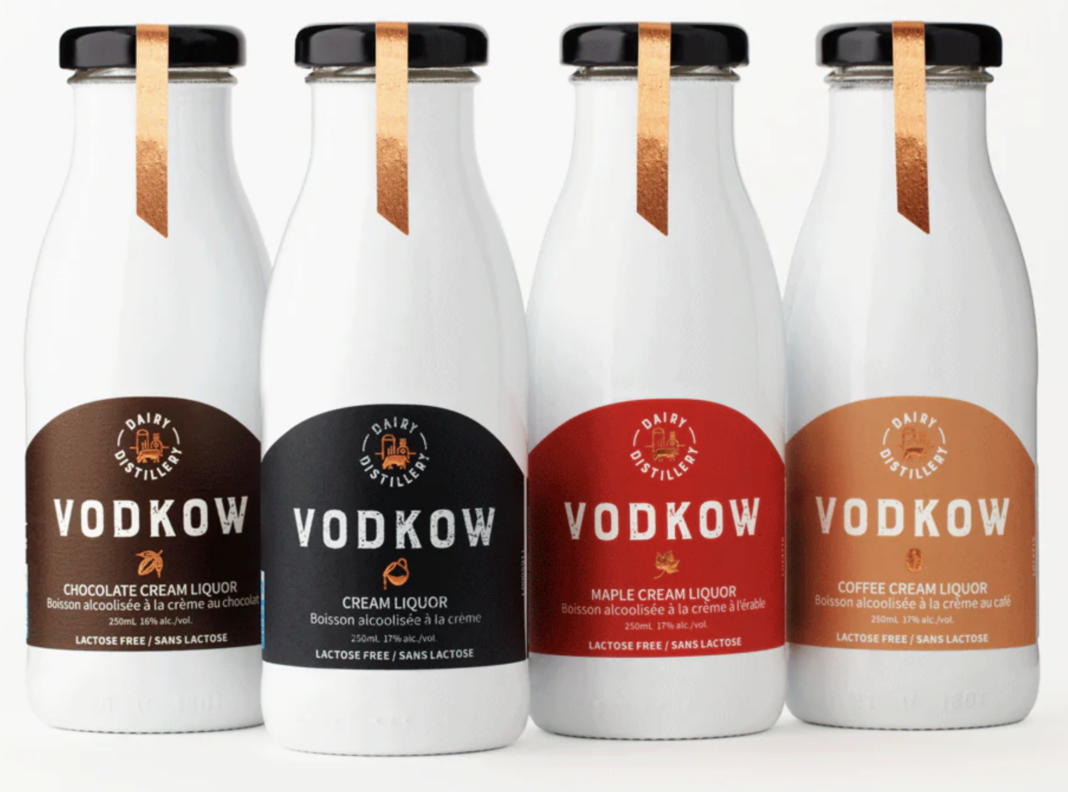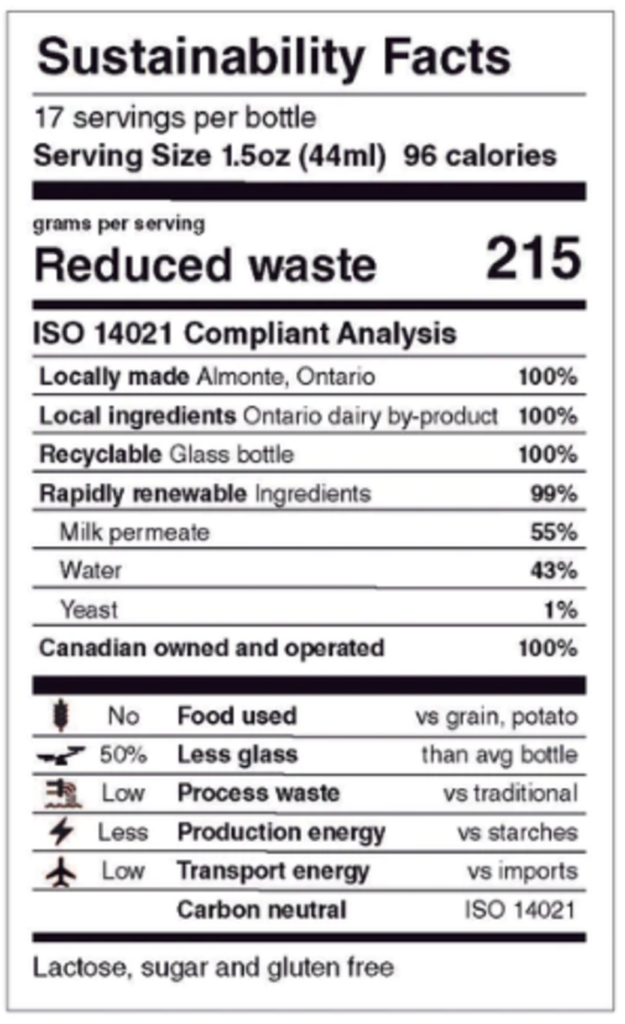Vodkow is a new vodka made from dairy waste, and you can try it in San Diego.
Ever since visiting a micro-distillery while visiting Charleston, South Carolina, Omid McDonald has been interested in distilling. He liked the end-products, of course. But perhaps its biggest draw was distilling’s inherent sustainability. “The waste reuse direction always seemed natural—taking something that is being thrown out and using it. There’s lots of examples in alcohol,” McDonald says. “Rum is a waste byproduct too. They’re taking the byproduct of sugar production, the molasses, and turning it into rum.”
McDonald went home and started making moonshine in his basement in a copper-pot still that he handmade. When his cousin, Neal McCarten, told him about the waste being produced on a family member’s dairy farm, he saw an opportunity. The cousins jumped in with both feet and started the Dairy Distillery.
Initially, McDonald had heard about skim milk being dumped by dairy producers and thought that this could provide a reliable source of fermentable sugars for distilling, but after conversations with folks along the dairy supply chain, he realized that waste skim milk was not being discarded consistently enough to be his only source of lactose, and often this waste was already being used in livestock feed. However, as dairies began implementing ultra-filtration systems to produce lactose-free, high-protein milk (think: Fairlife), they were also discarding more milk permeate.
“The way they make [ultra-filtered milk] is they push the skim milk through a membrane so the proteins and fats stay on one side of the membrane and the lactose and the water filters out, becoming what is essentially a waste stream to them,” McDonald explains. “They could feed it to pigs, but it has no value—it’s 86% lactose, which is sugar. That is perfect to distill.”
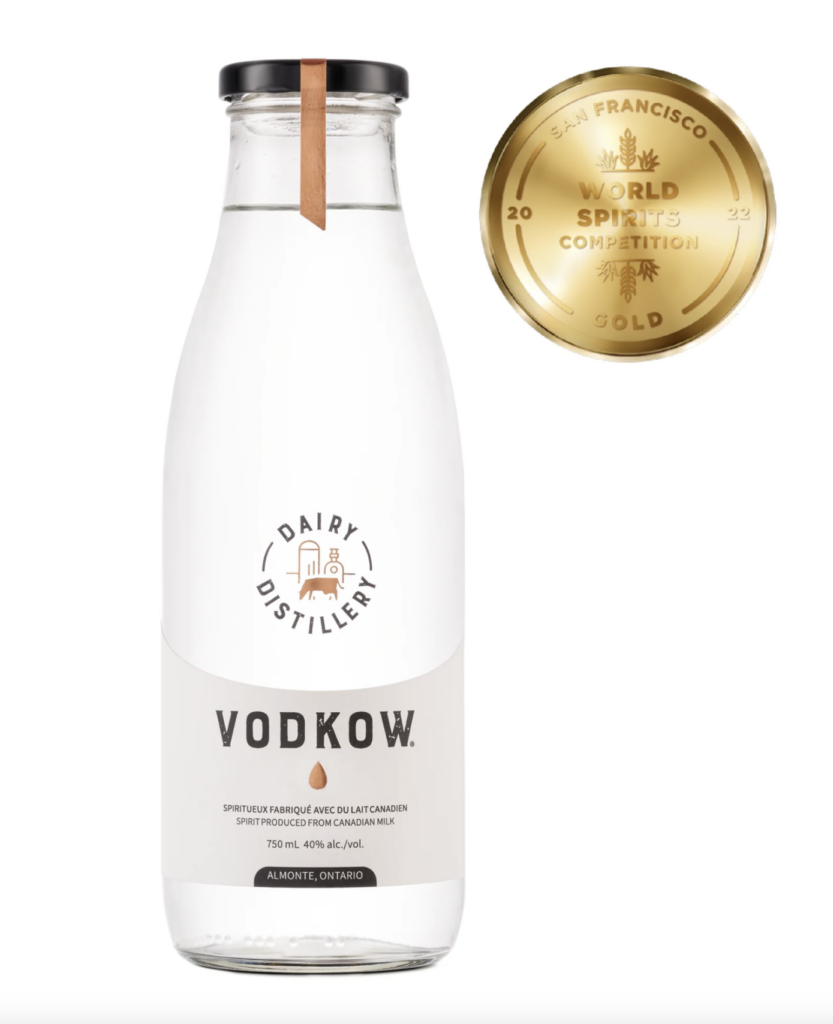
Historically, the Mongols and people of the Russian Steppes distilled milk sugars, so McDonald and McCarten set out to update these traditional mechanisms to suit large-scale production. To do this, they worked with the University of Ottawa to find a way to ferment milk permeate into vodka. In 2018, after positive results in the lab, McDonald and McCarten built a distillery in Almonte, Ontario. Shortly thereafter, they secured deals with dairy producers for milk permeate—the lactose-rich by-product of ultra-filtered milk production—and sold their first bottles of Vodkow, vodka, and cream liquors.
But how does vodka made from milk taste?
Well, it tastes like vodka! “If we were to sample a potato vodka, grain vodka, beet vodka, carrot vodka—they all taste slightly different,” McDonald explains. “I taste a slight sweetness to it. Some people find the ‘dairy-ness’ comes through as the mouthfeel.”
When hosting in-person tasting events, McDonald encounters folks who are freaked out by the idea of a vodka made from dairy waste as well as folks who are excited to try out an interesting spirit made sustainably. “When we first got into this, we were nervous to use the word ‘waste.’ We didn’t want people thinking, ‘Oh, they used gross milk.’ So we used the term ‘unused milk sugars,’” McDonald says. But their customers surprised them. “Once we heard people saying, ‘Oh, you’re telling me that you’re taking this waste product and turning it into a delicious vodka? That is so cool.’ That was a learning experience for us.”
How It’s Made
Vodkow sources their milk permeate from Canada’s largest dairy in Winchester, Ontario, which produces over 100,000 L of milk permeate per day. Each 750 mL bottle of Vodka upcycles 3.7 kg of milk permeate that would have been otherwise discarded.
The milk permeate arrives to Vodkow cold, pasteurized, and drinkable (but not tasty)—it is a very thin, sweet milk with a slight yellow color due to the riboflavin content. This liquid is ready to distill right off the truck. “From a production point of view, we don’t have to do any energy intensive processes to get at our sugars,” McDonald explains. “For example, if you’re working with grains you do a process called ‘mashing’ where you convert the starches to sugars so you can ferment them.”
The milk permeate goes into the tankers and yeast is introduced. Many yeast strains are lactose intolerant, but in their work with the University of Ottawa, Vodkow found a natural yeast that eats lactose, converting the sugars into alcohol over the course of two days. At the end of this process, they are left with a wine of 7% ABV. From here, the distilling process is the same as you’d expect with any other spirit. Vodkow uses copper stills to bring the distillate up to 97% pure alcohol. This is finally diluted with water to become vodka at 40% ABV (80 proof). For their cream liquors, they mix the alcohol with cream, sugar, and any additional flavours.
While Vodkow’s process uses dairy, the vodka itself is dairy-free, containing no dairy proteins or lactose. Their cream liquors contain dairy proteins, but are also lactose-free. Both the vodka and the cream liquors are gluten-free as the Dairy Distillery is entirely grain-free. “I have some vegan friends who drink Vodkow because they like the waste re-use element,” McDonald notes. “But we’re very upfront that this is ultimately from cattle.”
McDonald recognizes that Vodkow is not the first modern attempt to convert dairy waste into alcohol. “People had this idea back in the seventies, they were actually looking at using lactose to make ethanol for powering cars. But then, after the oil crisis ended, the whole idea sort of disappeared,” McDonald says. “Now, there’s maybe three or four of us in the world working with lactose.”
Carbon Neutrality and Sustainability
In addition to making their vodka from a waste product, Vodkow’s unique packaging reflects their commitment to sustainability. “Our packaging looks like an old school milk bottle, but it’s actually an Italian pasta sauce bottle. We ended up using this because it’s the lightest 750mL bottle in the liquor store at 220 grams,” McDonald says. “We wanted something that looked the part, but when we looked at the sustainability side, fifty percent of the carbon footprint of a bottle of spirits comes from glass production. This bottle was half the weight of a typical bottle, so we’re already reducing our carbon footprint.”
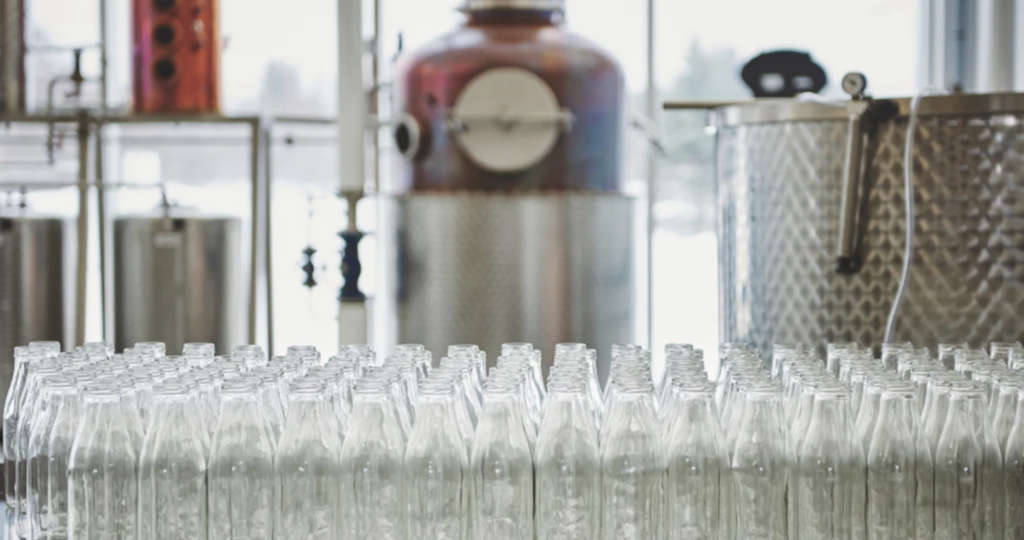
All of this allows Vodkow to operate as a carbon-neutral distillery. “The combination of using a waste sugar, lower production energy, and a much lighter bottle gets us to a naturally low carbon footprint per bottle—we then purchase carbon offsets,” McDonald explains. They offset their carbon footprint by working with Tree Canada’s “Grow Clean Air” program that plants trees guaranteed to sequester carbon for 30 years. So far, Vodkow has offset 1,285,700 kg of carbon emissions. Vodkow prioritizes transparency regarding their carbon footprint and is one of a few distilleries in Canada to publish their carbon assessment.
In 2022 Vodkow’s vodka took home gold at the World Spirits Competition, and in 2023, Vodkow was awarded Best Distillery by the Ottawa Awards. Moving forward, McDonald is working with partners in the U.S. to convert milk permeate into fuel ethanol. In May 2023, Dairy Distillery announced a partnership with the Michigan Milk Producers Association where in 2025 they plan to start production on an ethanol plant connected to a dairy production facility in Constantine, Michigan. “It’s an exciting project,” McDonald says. “We’re once again taking a waste product and using it for the betterment of the environment.”
Vodkow’s vodka and flavored cream liquors are currently available at the LCBO in Ontario, and online for delivery in Canada ($15 flat rate in Ontario; free shipping in Canada for orders over $95), and at select locations in the U.S. San Diego is one of their first U.S. markets — you can try out some Vodkow-based cocktails at Cafe 21.
Print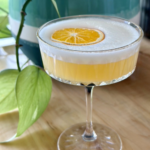
RECIPE: Morning Glory Cocktail
Ingredients
- 1 1/2 ounce Vodkow vodka
- 1 ounce orange juice
- 1/2 ounce lemon juice
- 3/4 ounce blood orange simple syrup
- 1 ounce egg whites
- 3 dashes orange bitters
- 1 orange wheel (for garnish)
Instructions
- Fill a shaker half full with ice.
- Add ingredients and shake vigorously for a minute, until the outside of the share becomes frosty.
- Strain into a glass.
- Garnish, and enjoy!

